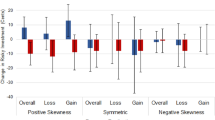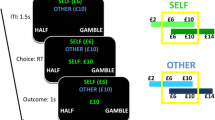Abstract
This study examines the potential effects of random gain, loss, or neutral outcomes on individuals’ judgments of randomness in life and in unpredictable life events. Based on existing evidence, we hypothesize that experiencing gain would decrease the perception of randomness, whereas loss would have the opposite effect. One-hundred and ten students participated in a random bet for academic credit required for their introductory psychology course, where they could experience gain (bonus credit), loss (no credit), or neutral (exact credit as promised) outcomes. In addition, they filled out a questionnaire on their beliefs in randomness in general and in various everyday life events, as well as their judgment of the extent to which each event was pre-determined. The results provide partial support for our hypotheses. The participants experiencing a ‘neutral’ result report the highest level of randomness in general and in everyday life events, as well as the highest extent to which the events were judged as pre-determined. Randomness was judged as lower in both the ‘loss’ and ‘gain’ conditions. These patterns only emerge after controlling for gender and religiosity. The results are discussed in light of existing evidence and directions for future studies.
Similar content being viewed by others
References
Ayton, P., & Fischer, I. (2004). The hot hand fallacy and the gambler’s fallacy: Two faces of subjective randomness? Memory & cognition, 32, 1369–1378.
Bargh, J. A., & Chartrand, T. L. (2000). The mind in the middle: A practical guide to priming and automaticity research. In H. T. Reis & C. M. Judd (Eds.), Handbook of research methods in social and personality psychology (pp. 253–285). New York: Cambridge University Press.
Bar-Hillel, M., & Wagenaar, W. A. (1991). The perception of randomness. Advances in Applied Mathematics, 12, 428–454.
Beck, R., & Miller, J. P. (2001). Erosion of belief and disbelief: Effects of religiosity and negative affect on beliefs in the paranormal and supernatural. The Journal of Social Psychology, 141, 277–287.
Boutin, C., Tremblay, N., & Lodouceur, R. (2009). Impact of visiting an on site Casino information center on perceptions about randomness and gambling. Journal of Gambling Studies, 25, 317–330.
Bressan, P., Kramer, P., & Germani, M. (2008). Visual attentional capture predicts belief in a meaningful world. Cortex: A Journal Devoted to the Study of the Nervous System and Behavior, 44, 1299–1306.
Burns, B. D., & Corpus, B. (2004). Randomness and inductions from streaks: Gamblers fallacy versus hot hand. Psychonomic Bulletin & Review, 11, 179–184.
Caruso, E. M., Waytz, A., & Epley, N. (2010). The intentional mind and the hot hand: Perceiving intentions makes streaks seem likely to continue. Cognition, 116, 149–153.
Diecidue, E., Schmidt, U., & Wakker, P. P. (2004). The utility of gambling reconsidered. The Journal of Risk and Uncertainty, 29(3), 241–259.
Epley, N., & Gilovich, T. (1999). Just going along: Noncoscious priming and conformity to social pressure. Journal of Experimental Social Psychology, 35, 578–589.
Gabriel, K. I., & Williamson, A. (2010). Framing alters risk tasking behavior on a modified balloon analogue risk task in a sex specific manner. Psychological Reports, 107(3), 699–712.
Hobfoll, S. E., Johnson, R., Hall, B. J., Palmieri, P. A., Canetti-Nisim, D., & Galea, S. (2009). Trajectories of resilience, resistance, and distress during ongoing terrorism: The case of Jews and Arabs in Israel. Journal of Consulting and Clinical Psychology, 77, 138–148.
Hodginson, G. P., Maule, A. J., Bown, N. J., Pearman, A. D., & Glaister, K. W. (2002). Further reflections on the elimination of framing bias in strategic decision making. Strategic Management Journal, 23, 1069–1076.
Israel Bureau of Statistics. (2008). Religions in Israel. Retrieved November 2011, from http://www1.cbs.gov.il/reader/cw_usr_view_Folder?ID=141.
Kahneman, D., & Tversky, A. (1972). Subjective probability: A judgment of representativeness. Cognitive Psychology, 3, 430–454.
Kareev, Y., & Trope, Y. (2011). Correct acceptance weighs more than correct rejection: A decision bias induced by question framing. Psychological Bulletin Review, 18, 103–109.
Kiesel, A., Kunde, W., & Hofmann, Y. (2007). Mechanisms of subliminal response priming. Advances in Cognitive Psychology, 3, 307–315.
Kimhi, S., & Zysberg, L. (2009). How people understand the world around them: Perceived randomness in rare life events. The Journal of Psychology: Interdisciplinary and Applied, 143, 5–13.
Nickerson, R. S. (2004). Cognition and chance: The psychology of probabilistic reasoning. Mahwah, NJ: Lawrence Erlbaum Associates Publishers.
Orenstein, A. (2002). Religion and paranormal belief. Journal for the Scientific Study of Religion, 41, 301–311.
Rapoport, A., & Jones, L. V. (1970). Gambling behavior in two outcome multistage betting games. Journal of Mathematical Psychology, 7, 163–187.
Rapoport, A., & Wallsten, T. S. (1972). Individual decision behavior. Annual Review of Psychology, 23, 131–176.
Rogers, P., Davis, T., & Fisk, J. (2009). Paranormal belief and susceptibility to the conjunction fallacy. Applied Cognitive Psychology, 23, 524–542.
Romanek, K. M., McCaul, K. D., & Sandgren, A. K. (2005). Age differences in treatment decision making for breast cancer in a sample of healthy women. Oncology Nursing Forum, 32, 799–806.
Rutjens, B. T., van Pligt, J., & van Harreveld, F. (2010). Deus or Darwin: Randomness and belief in theories about the origins of life. Journal of Experimental Social Psychology, 12, 1–2.
Sieber, J. E. (1982). Deception in social research I: Kinds of deception and the wrongs they may involve. IRB: A Review of Human Subject Research, 4(9), 1–6.
Tipper, S. P. (1985). The negative priming effect. The Quarterly Journal of Experimental Psychology, 37, 571–590.
Tipper, S. P., & Cranston, M. (1985). Selective attention and priming. The Quarterly Journal of Experimental Psychology, 37(4), 591–611.
Tversky, A., & Kahneman, D. (1981). The framing of decisions and the psychology of choice. Science, 211, 453–458.
Wolfram, S. (2002). New kind of science. New York: Wolfram Media.
Wright, A. J., Whiteell, S. C. L., Takeichi, C., Hankins, M., & Marteau, T. (2009). The impact of numeracy on reactions to different graphic risk presentation formats. British Journal of Health Psychology, 14, 107–125.
Zangench, M., Balasczynski, A., & Turner, N. (Eds.). (2008). In pursuit of winning. New York: Springer.
Author information
Authors and Affiliations
Corresponding author
Rights and permissions
About this article
Cite this article
Zysberg, L., Kimhi, S. Winning or Losing a Bet and the Perception of Randomness. J Gambl Stud 29, 109–118 (2013). https://doi.org/10.1007/s10899-011-9289-2
Published:
Issue Date:
DOI: https://doi.org/10.1007/s10899-011-9289-2




